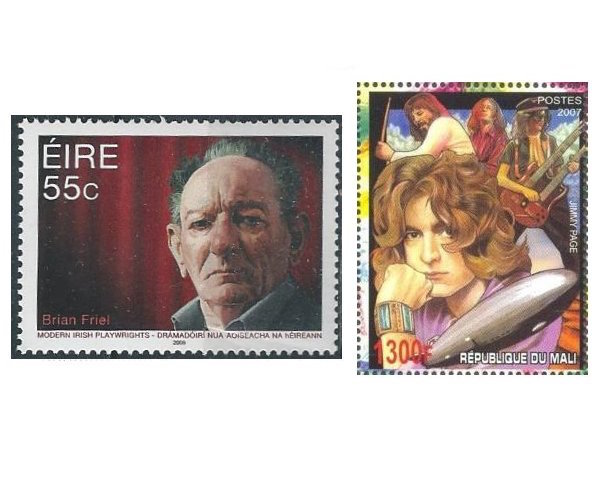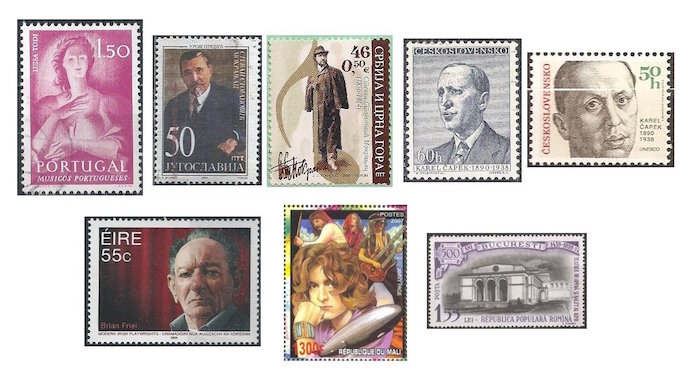The Arts on the Stamps of the World — January 9
An Arts Fuse regular feature: the arts on stamps of the world.

By Doug Briscoe
The writer who coined the term “robot,” Karel Čapek, was born on this date, along with Irish writer Brian Friel, Portuguese opera singer Luísa Todi, Serbian composer Stevan Mokranjac (mo-KRAHN-yahts), and Led Zeppelin guitarist Jimmy Page. January 9 also saw the opening of the Romanian National Opera building in Bucharest.
Mezzo-soprano Luísa Todi was born Luísa Rosa de Aguiar on January 9, 1753. She was an actor first, appearing in Molière’s Tartuffe while still only fifteen or sixteen. In 1770, she made her operatic debut in Giuseppe Scolari’s Il Viaggiatore Ridicolo and several years later began performing abroad: at King’s Theatre in London in 1777, at the Concerts Spirituels in Paris in 1778, in Germany and Austria in 1781, and as far as Russia, where she remained from 1784 to 1788 as teacher to Catherine the Great’s granddaughters. On leaving Russia, Todi performed before Frederick William II of Prussia and for the young Beethoven in Bonn (1790). Then it was on to Madrid for a further four years (1792-1796). During the Peninsular War Todi and her family were arrested by the invading French, but preserved under the protection of General Soult. She was completely blind for the last ten years of her life and died on October 1, 1833.
Stevan Stojanović (sto-YAHN-o-vitch; 9 January 1856 – 28 September 1914) became known as Stevan Mokranjac, because his ancestors were from the village of Mokranje near the border with Romania and Bulgaria. He studied in Belgrade, Munich (with Rheinberger), Rome, and Leipzig (with Reinecke). In 1887 he moved to Belgrade and became conductor of the Belgrade Choir Society, with which he toured widely with great success. In 1899 Mokranjac founded the first Serbian string quartet (he was the cellist, says Wikipedia—Grove Online says second violin) and the Serbian Music School, which was renamed the Mokranjac Music School after his death. His compositions were almost entirely choral, including a collection called Bouquets, based on folk songs of the region, The Divine Liturgy of St. John Crysostom, and The Glorification of Saint Sava (whom I mentioned just the day before yesterday in connection with the Montenegrin composer Jovo Ivanišević!). Mokranjac is so highly regarded in Serbia that his image has appeared on the currency of both Yugolavia and Serbia as well as on stamps of both entities. His nephew was the composer Vasilije Mokranjac.
Writer, publisher, photographer, and art critic Karel Čapek (1890 – 25 December 1938) is likely best known today is a pioneer of science fiction with his novel War with the Newts (1936) and play R.U.R. (Rossum’s Universal Robots, 1920), which is the source of the word robot. The term is derived from the Slavic root for “work,” but more to the point, the Czech word “robota,” according to Wikipedia, “means forced labour of the kind that serfs had to perform on their masters’ lands and is derived from ‘rab,’ meaning ‘slave’”. (The “robots” in the play are actually more like clones, biological in origin rather than mechanical.) Critical of absolutism (specifically both Communism and Nazism), Čapek became a journalist and was a good friend of Tomáš Masaryk, but with a history of poor health, he died of pneumonia at the age of 48.

The late dramatist Brian Friel (1929 – 2 October 2015) has been called the “Irish Chekhov.” Friel was fascinated with the Russian master and even made a translation of The Three Sisters. (He also adapted Turgenev’s novel Fathers and Sons and A Month in the Country for the stage.) Friel founded the Field Day Theatre Company in Derry in 1980. He published two volumes of short stories in addition to his two dozen plays. The stamp was given to me by Arts Fuse contributor and long-time friend Steve Elman, who visited Ireland in 2008 and kindly picked up some recently issued stamps for me.
I confess to being an ignoramus about rock and will assume you know more about Jimmy Page than I do. But you may not know that the Led Zeppelin founder was born on this day in 1944. As with yesterday’s David Bowie entry, we turn to another souvenir sheet, this one from Mali called “Gods of the Guitar” and celebrating Page and Jimi Hendrix. (I’ve cropped the image to show only the Page stamp.)
The building housing the Romanian National Opera in Bucharest was built in 1953 to a design by architect Octav Doicescu (1902-1981). Today is the 63rd anniversary of the first opera performance given there: it was Tchaikovsky’s Queen of Spades (9 January 1954). (On the following night the house saw its first ballet, Delibes’ Coppélia.) The stamp was issued in 1959, one of a set marking the 500th anniversary of the founding of Bucharest.
Though I know of no stamp for her, Joan Baez (b. 1941) also celebrates her birthday today.
A graduate of the University of Massachusetts with a B.A. in English, Doug Briscoe worked in Boston classical music radio, at WCRB, WGBH, and WBUR, for about 25 years, beginning in 1977. He has the curious distinction of having succeeded Robert J. Lurtsema twice, first as host of WGBH’s weekday morning classical music program in 1993, then as host of the weekend program when Robert J.’s health failed in 2000. Doug also wrote liner notes for several of the late Gunther Schuller’s GM Recordings releases as well as program notes for the Boston Classical Orchestra. For the past few years he’s been posting a Facebook “blog” of classical music on stamps of the world, which has now been expanded to encompass all the arts for The Arts Fuse.
